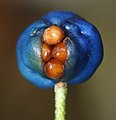Clintonia udensis
| Clintonia udensis | |
|---|---|

| |
| Scientific classification | |
| Kingdom: | Plantae |
| Clade: | Tracheophytes |
| Clade: | Angiosperms |
| Clade: | Monocots |
| Order: | Liliales |
| Family: | Liliaceae |
| Subfamily: | Lilioideae |
| Genus: | Clintonia |
| Species: | C. udensis
|
| Binomial name | |
| Clintonia udensis | |
| Synonyms[1][2] | |
| |
Clintonia udensis is a species of flowering plant in the lily family Liliaceae. It is the only species of Clintonia native to Asia. It prefers sparsely forested habitat including the alpine forests of the Himalayas.
Description
[edit]Clintonia udensis is a perennial herbaceous plant that spreads by means of underground rhizomes, forming colonies on the floors of temperate forests. It has 3--5 egg-shaped to elliptical leaves, each leaf 8 to 25 cm (3 to 10 in) long and 3 to 16 cm (1 to 6 in) wide. The leaf margins are pubescent when young. The pubescent stem (technically, a scape) is 10 to 20 cm (4 to 8 in) long. While fruiting, the stem elongates up to 60 cm (24 in) long. The inflorescence is 3--12-flowered, in short terminal racemes with densely pubescent pedicels. The tepals are white, sometimes bluish, each tepal 7 to 12 mm (0.3 to 0.5 in) long. The berries are dark blue, almost black, up to 12 mm (0.5 in) across.[3][4]
-
Flowers (Mount Choshi, Japan, 13 June)
-
Fruiting plant with ripe fruit (Kiso Mountains, Japan, 23 September)
-
Fruit and seeds (Hida Mountains, Japan, 14 August)
Taxonomy
[edit]Clintonia udensis was first described by Ernst Rudolf von Trautvetter and Carl Anton von Meyer in 1856.[5] The specific epithet udensis, which means "from the River Uda or the Uden district of Siberia",[6] evidently refers to a region in the Russian Far East where the plant is known to occur.
As of September 2020[update], Plants of the World Online accepts the following infraspecific names:[2]
- Clintonia udensis var. alpina (Kunth ex Baker) H.Hara
- Clintonia udensis var. udensis
The word alpina means "of upland or mountainous regions".[7] Indeed, members of C. u. var. alpina are exclusively found above 3,200 m (10,499 ft) in the Himalayas.[8]
Some authorities do not accept the above infraspecific names.[9] The claim is that there are no morphological characters that consistently separate the two varieties.[10]
Distribution
[edit]Clintonia udensis is wide-ranging, from the Russian Far East to southeast Asia, extending east-west from the Kuril Islands in the Pacific Ocean to the Western Himalaya region.[2][3]
- Bhutan
- China: Gansu, Hebei, Heilongjiang, Henan, Hubei, Jilin, Liaoning, Shaanxi, Shanxi, Sichuan, Tibet Autonomous Region (Xizang), Yunnan
- India: Assam, Sikkim, Uttarakhand
- Japan
- Korea
- Myanmar (Burma)
- Nepal
- Russia: Amur Oblast, Khabarovsk Krai, Kuril Islands, Primorsky Krai, Sakhalin
C. u. var. alpina is found in the Himalayas (from Uttarakhand to Bhutan), Assam, northern Myanmar, and western China.[8]
Bibliography
[edit]- Trautvetter, Ernst Rudolf von; Meyer, Carl Anton von (1856). Florula Ochotensis Phaenogama. St. Petersburg: K. Akademia der Wissenschaften. Retrieved 28 September 2020.
- Gledhill, David (2008). The Names of Plants (4th ed.). Cambridge University Press. ISBN 978-0-521-86645-3.
References
[edit]- ^ "Clintonia udensis". World Checklist of Selected Plant Families (WCSP). Royal Botanic Gardens, Kew. Retrieved 28 September 2020.
- ^ a b c "Clintonia udensis Trautv. & C.A.Mey. Raf.". Plants of the World Online. Royal Botanic Gardens, Kew. Retrieved 28 September 2020.
- ^ a b Chen, Xinqi; Tamura, Minoru N. "Clintonia udensis". Flora of China. Vol. 24 – via eFloras.org, Missouri Botanical Garden, St. Louis, MO & Harvard University Herbaria, Cambridge, MA.
- ^ Trautvetter & Meyer (1856), Plate 30 with caption.
- ^ Trautvetter & Meyer (1856), pp. 92-93.
- ^ Gledhill (2008), p. 392.
- ^ Gledhill (2008), p. 43.
- ^ a b "Clintonia udensis var. alpina". Annotated Checklist of the Flowering Plants of Nepal – via eFloras.org, Missouri Botanical Garden, St. Louis, MO & Harvard University Herbaria, Cambridge, MA.
- ^ "Clintonia udensis var. alpina (Kunth ex Baker) H.Hara". Plants of the World Online. Royal Botanic Gardens, Kew. Retrieved 5 August 2020.
- ^ Wagner, Richard H. (December 1973). "The East Asian Species of Clintonia Raf. (Liliaceae)". Botanical Gazette. 134 (4): 268–274. doi:10.1086/336714. S2CID 84243942.
External links
[edit]- "Illustration: Clintonia udensis". Flora of China. Retrieved 28 September 2020.



